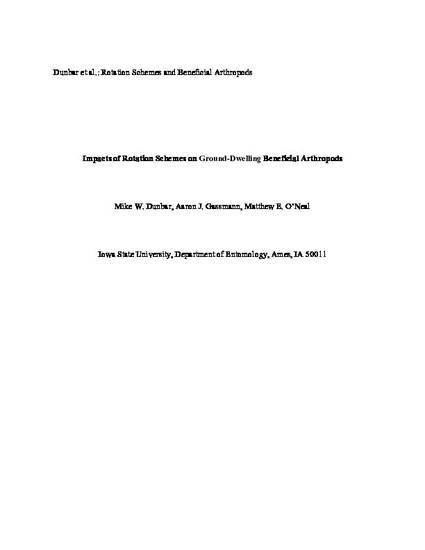
Crop rotation alters agroecosystem diversity temporally, and increasing the number of crops in rotation schemes can increase crop yields and reduce reliance on chemical inputs. We hypothesized that increased crop diversity within annual rotations would positively affect ground-dwelling beneficial arthropod communities. During 2012 and 2013, pitfall traps were used to measure activity-density and diversity of ground-dwelling communities within three previously established, long term crop rotation studies located in Wisconsin and Illinois. Rotation schemes sampled included continuous corn, a two-year annual rotation of corn and soybean, and a three-year annual rotation of corn, soybean, and wheat. Insects captured were identified to family, and non-insect arthropods were identified to class, order, or family depending upon the taxa. Beneficial arthropods captured included natural enemies, granivores, and detritivores. Beneficial communities from continuous corn plots were significantly more diverse compared to those from two-year annual rotation, while communities from three-year annual rotation did not differ from either rotation scheme. However, no differences were detected among rotation schemes in either corn or soybean plots for total community activitydensity or activity-density of any individual taxa. Crop species within all three rotation schemes were annual crops, and are associated with agricultural practices that make infield habitat subject to anthropogenic disturbances and temporally unstable. Habitat instability and disturbance can limit the effectiveness and retention of beneficial arthropods, including natural enemies, granivores, and detritivores. Increasing non-crop and perennial species within landscapes in conjunction with more diverse rotation schemes may increase the effect of biological control of pests by natural enemies.
Available at: http://works.bepress.com/aaron_gassmann/92/

This is a manuscript of an article published as Dunbar, Mike W., Aaron J. Gassmann, and Matthew E. O’Neal. "Impacts of rotation schemes on ground-dwelling beneficial arthropods." Environmental entomology 45, no. 5 (2016): 1154-1160. doi:10.1093/ee/nvw104. Posted with permission.